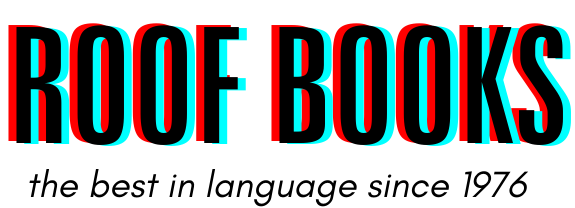I, BOOMBOX
by Robert Glück
I, Boombox is fashioned from my misreadings. In that sense, it’s an autobiography in which I dream on the page. It is my version of the modernist long poem: published in sections and interrupted only by the author’s death. —Robert Glück
Roof Books presents Robert Glück's unmissable new work: I, Boombox. Glück is a seminal figure in the experimental landscape. In 1980s San Francisco, he co-founded the venerated New Narrative movement. His innovative prose has long made him an underground favorite, but lately he's received wider attention through publication by New York Review Books. His contributions as a verse poet are equally exciting, but harder to come by. Fans have been hungrily anticipating I, Boombox, a jolting new provocation full of restless musical desire and "synchronies of/recognition."
This is a sexy poem of bellicose minimalism with a sly sense of prosody. Instigative miscomprehension becomes the mode of discovery and generation: "I cast my net, /inattention." The subconscious refracts reportage, fiction, poetry, decorative arts, et cetera into streams of meaning, daydreaming, and perverse nonsense. Death lurks in pleasure's subtext. Glück implores: "Start a genital/uprising," but "the rest is memory."
I, Boombox is a major new long poem, two decades in the making, delivered from the New Narrative perspective. It will "stun on every/page." Our handsome paperback edition is illustrated by Colter Jacobsen. Glück will teach you how to "Breathe into/history with/your wet mouth, that/intricately/corrupt primal/real estate." Rush out and crack open I, Boombox as soon as you can!
People are Saying:
Rimbaud infamously claimed that I is an other, but for Bob I is a flicker of error, or a wandering ear that invents. He has made a home for several decades of errant listening in this sinuous long poem, which light heartedly teases the modernist tradition it also subverts. In true mock-heroic manner, Bob reveals from his gay marble desk how God’s laughter glides in and out of garden festival, action film and sublet alike. I have been waiting for this book for years and it sweetly exceeds all of my hopes. —Lisa Robertson
In I, Boombox, Robert Glück makes it clear that dreams are as real as the spurts of sentences we use to discover them. Scoring the “um-bilical/indescribabilia” that accompanies unconscious feeling into a thin strip of thickly montaged verse, the “invisible speakers” that populate Glück’s poem—their misreadings and cant half-truths, their headlines and lies—turn dream’s content into poetic foam. In this mind’s eye—the “suburb” is blithely rendered into a thing “superb,” and “loneliness” roars with the face of a “lioness/and intimacy.” I, Boombox is a poem of frothy divinations tempered by the slapstick of speech. It suggests that desire without sense is desire nevertheless—and this is a delight to understand. —Shiv Kotecha
About the Author:
Robert Glück served as director of San Francisco State University’s The Poetry Center, co-director of Small Press Traffic Literary Center, and associate editor at Lapis Press. His books include two novels, Jack the Modernist and Margery Kempe, two books of stories, Elements of a Coffee Service and Denny Smith, a book of poems, Reader, and with Kathleen Fraser, a book of prose poems, In Commemoration of the Visit. With Bruce Boone, Glück translated La Fontaine for a book of that name. With Camille Roy, Mary Berger, and Gail Scott, he edited Biting the Error: Writers on Narrative. Glück prefaced Between Life and Death for a volume of Frank Moore’s paintings, and, with artist Dean Smith, made the film Aliengnosis, based on readings from I, Boombox. Other books include Communal Nude: Collected Essays, and Parables, an editioned artist book with Cuban artists José Angel Toirac and Meira Marrero Díaz. Margery Kempe was republished by NYRB Classics in 2020 and his novel About Ed by NYRB in 2023.

